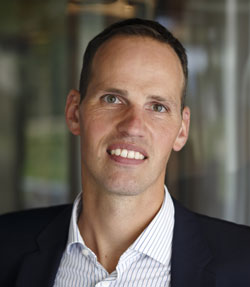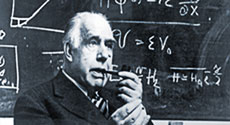Niels Bohr Lecture by Ronald Hanson
Title: The dawn of quantum networks

Ronald Hanson, QuTech and Kavli Institute of Nanoscience, Delft University of Technology, The Netherlands.
Abstract: Entanglement – the property that particles can share a single quantum state - is arguably the most counterintuitive yet potentially most powerful element in quantum theory. The non-local features of quantum theory are highlighted by the conflict between entanglement and local causality discovered by John Bell. Decades of Bell inequality tests, culminating in a series of loophole-free tests in 2015, have confirmed the non-local of nature.
Future quantum networks may harness these unique features of entanglement in a range of exciting applications, such as quantum computation and simulation, secure communication, enhanced metrology for astronomy and time-keeping as well as fundamental investigations. To fulfill these promises, a strong worldwide effort is ongoing to gain precise control over the full quantum dynamics of multi-particle nodes and to wire them up using quantum-photonic channels.
Diamond spins associated with NV centers are promising building blocks for such a network as they combine a coherent electron-optical interface [1] (similar to that of trapped atomic qubits) with a local register of robust and well-controlled nuclear spin qubits [2].
Here I will introduce the field of quantum networks and discuss future plans and ongoing work with the specific target of realizing the first multi-node network wired by quantum entanglement, including first primitive network experiments [3,4].
References
[1] W. Pfaff et al., Science 345, 532 (2014); B. Hensen et al., Nature 526, 682 (2015).
[2] J. Cramer et al., Nature Comm. 7, 11526 (2016).
[3] N. Kalb et al., Science 356, 928 (2017).
[4] P.C. Humphreys et al., https://arxiv.org/abs/1712.07567.
- AUD. 3 at HCØ, February 7, 2018 at 15:15
As usual, coffee, tea and cookies will be served in front of the auditorium at 14:55.
About Ronald Hanson
Ronald Hanson (1976) focusses on exploring and controlling quantum-entangled states with the long-term goal of exploiting these in future quantum technologies such as quantum computing and quantum internet. His research combines quantum optics, solid-state physics, nuclear magnetic resonance, quantum information theory and nanofabrication.In 2014 his group made headlines by teleporting quantum data between electrons on distant solid-state chips. In 2015 he ended a decades-long scientific quest by performing the first loophole-free Bell test. More recently, his group realized the distillation of remote entanglement (2017). In the coming years he aims to build on these results to demonstrate the fundamentals of a future quantum internet, with a rudimentary 4-city network planned for 2020.
Ronald is one of the four founding professors of QuTech (2013) and currently QuTech’s Scientific Director. He obtained his MSc degree in Applied Physics at the University of Groningen (1999), followed by a year in Japan. He obtained his PhD degree (cum laude) at Delft University of Technology in 2005 with Leo Kouwenhoven. After a postdoc at the University of California in Santa Barbara with David Awschalom, he started his own research group at Delft, where he was appointed Antoni van Leeuwenhoek Professor in 2012.
Ronald has received several awards for his work, among which the Nicholas Kurti European Science Prize (2012), QIPC Young Investigator Award (2012), the Ammodo KNAW Award by the Dutch Royal Academy of Sciences (2015), the Huibregtsen Award for Excellence in Science and Society (2016) and the John Stewart Bell Prize (2017).
|
Coffee and Cookies
|

 Niels Bohr Lectures
Niels Bohr Lectures 